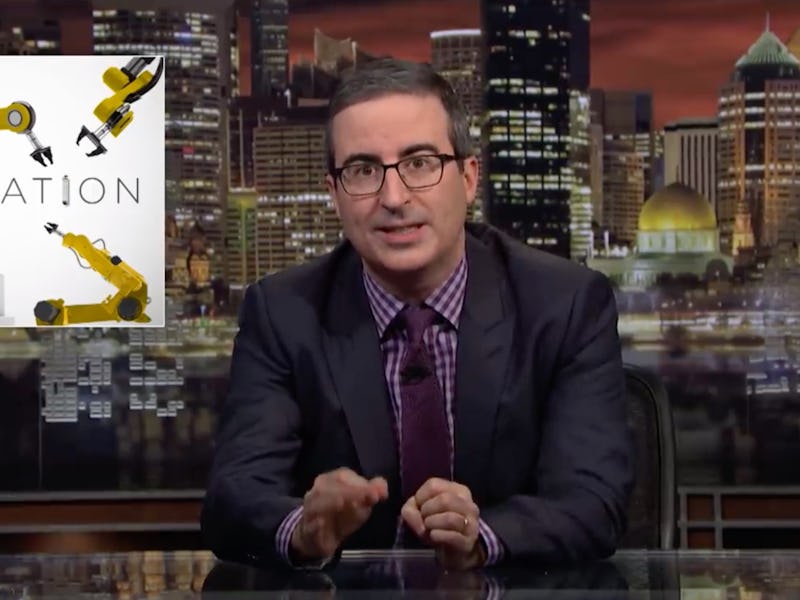John Oliver Gives Kids a Tough Lesson on A.I. and Robot Job Losses
The 'Last Week Tonight' host warned about growing automation.

Robot automation is transforming society, but John Oliver is worried that kids aren’t prepared. The Last Week Tonight host used Sunday’s episode to highlight the large-scale shift as super-smart A.I. take over human roles, something that many kids — and president Donald Trump — don’t truly appreciate.
Oliver criticized the president’s focus on manufacturing jobs outsourced to other countries. While Oliver conceded that some of these jobs are moving overseas, he also cited industry figures that show American manufacturing produces twice as much as it did in 1984, but with a third of the jobs.
“Many of those jobs aren’t being stolen,” Oliver said. “They are disappearing because machines are now doing them, and thanks to advances in A.I. and robotics there are concerns that this sort of job loss could accelerate.”
To illustrate this point, Oliver interviewed a series of kids and asked them about what they want to do when they grow up. The answers cover most of the jobs you’d expect to hear, like a nurse, drummer, rockstar ballerina and more, but Oliver shot these down and asked the kids to choose a job that a robot can’t do.
“Can a robot get wet?” one kid asked.
“Yes, a robot can get wet,” Oliver responded. “That’s not a job, but yes, a robot can get wet.”
It makes for painful viewing, but the point is important. A projhection from the World Economic Forum in September 2018 predicted that more than half of current jobs will be done by machine by 2025. Stephen Hawking warned in October 2015 that technology seems to be driving “ever-increasing inequality.” However, when Inverse spoke to Trump supporters at a rally, many suggested that factory automation would be largely good and would not replace humans entirely.
Oliver noted that automation probably won’t play out with direct reductions in jobs. Bank teller employment rose from 1980 to 2010 despite the invention of the ATM, as the tellers spent their time focusing more on other tasks than handing out money. David Autor, an economist at MIT, noted that automation could lead to new jobs, explaining how today’s society where just two percent of jobs would be in agriculture would seem bizarre to people from hundreds of years ago.
Although new jobs may result from automation, moving people into these new roles is going to be tough. The Metropolitan Policy Program at the Brookings Institute suggests funding retraining, directed toward available jobs in peoples’ current areas. Policy could also help older workers forced to take lower-paying jobs with paid job wage insurace or expanded earned income tax credit. Farai Chideya, author of The Episodic Career, has suggested the children of the future will need to think of their life spanning multiple careers.
“It’s great to ask kids for example what do you want to be when you grow up, but one thing that might be added to that question is what five things do you wanna be when you grow up,” Chideya said.
It’s hard to picture now, but it could be the future direction of society. Last Week Tonight airs Sundays on HBO.